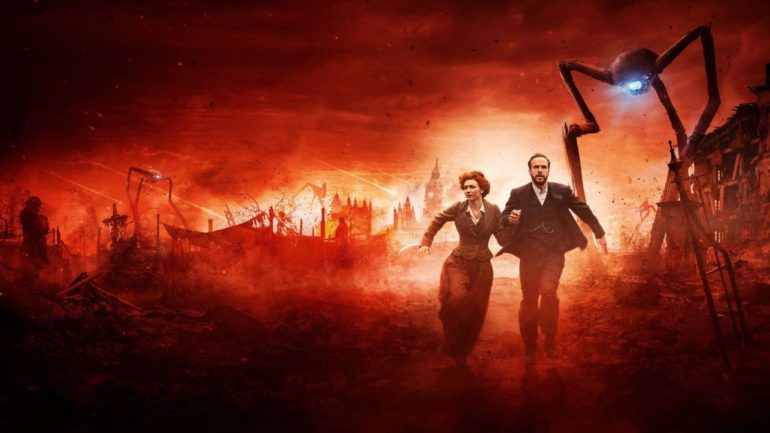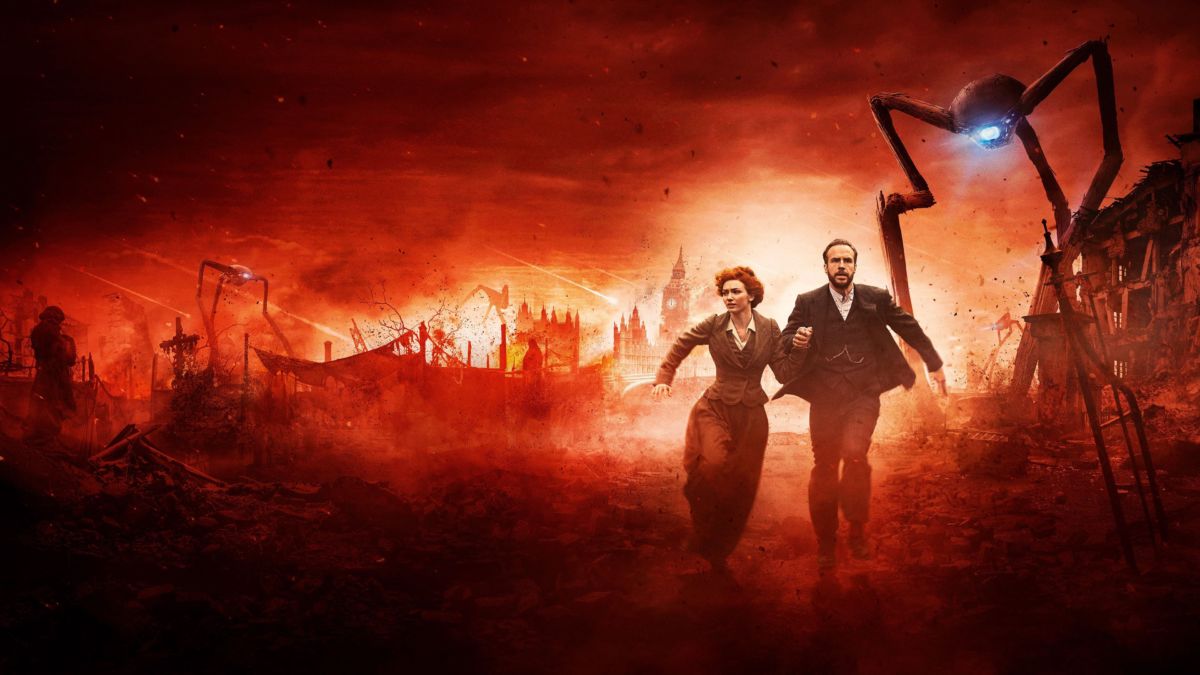It’s obvious the BBC were really pushing for their most recent version of H.G. Wells’s The War Of The Worlds to be a big hit. Airing immediately after the new version of His Dark Materials over the past three weeks, the mini-series boasts an all-star cast and excellent, movie-level production values. And yet, while it has its moments, the end result largely lacks the confidence His Dark Materials has in both in adapting and expanding upon the original novels.
When you’re adapting a popular book that’s over a century old, the problem is that this really isn’t anything we haven’t seen done before. There’s been dozens of previous adaptations – hell, Fox and Studio Canal literally just brought out their own version a month ago. And that’s not even counting the thousands of other works riding off the back of The War Of The Worlds, since the book practically invented the Alien invasion genre. When you’ve got these happening every week in cinema’s, there’s no way it can have the same kind of impact as, for the example, the 1930s radio version, which reportedly had people across American genuinely believing Martians were invading. We are treated throughout to visions of towns and cities being destroyed, of thousands being killed, and sure it looks great. But none of it feels like anything all that new.
The BBC’s new version aims at a bit of originality by being pretty much the only version actually set in the time it was written, with the same characters that appeared in the novel. Whereas other adaptations have switched to a more modern setting, echoing contemporary fears such as nuclear war or 9/11, the new version depicts aliens invading Edwardian Britain, where the Martians are taken on with Gatling guns and Dreadnoughts. At a purely superficial level then, this is a series which consciously seeks to recreate the imagery of novel to a far greater degree than previous efforts – from the toxic Black Smoke to the Red Weed terraforming Earth, and to start with it all seems highly promising for fans of the books.
The issue with this is that The War Of The Worlds was never written as a period piece – it’s supposed to be about reflecting contemporary fears and anxieties. The series focuses throughout on how Britain dominated the rest of the world at the time, with Rafe Spall’s character George directly comparing the Martian’s conqeust to what it must have been like for men armed only with spears to face off against British redcoats. All this is pretty true to the book – Wells was a lifelong socialist and internationalist who wanted to put the reader in the shoes of the oppressed. But with the Empire now a thing of the past, the Britain depicted in this series can’t help but feel like a bit of a caricature.
The entire first half of the episode is bogged down in a meandering sub-plot about an unmarried couple being unable to tie the knot due to the laws surrounding divorce at the time. Eleanor Tomlinson’s character, Amy, is constantly being reproached or patronised by the men around her, with dialogue that would be more suited to Jane Austen than H.G. Wells. It takes a bit of a stretch of the imagination to suppose people would genuinely be having a go at her or her partner for their relationship choices when the entire world is literally being reduced to rubble around them.
This isn’t to say that a drama like this shouldn’t comment on the attitudes of the time, given that that’s the entire point of the book. But it’s so over the top here that’s it’s pushed to the point of absurdity. There’s one moment where the Prime Minster – literally seconds after witnessing all of London be wiped out with the Black Smoke, as well as being on the verge of death from it himself – is suddenly getting all excited about the military potential of such weapons. The post-apocalyptic wilderness we keep flashing forwards to has, we soon see, discovered religious fanaticism, completely dismissing the use of vaccines as ‘Darwinism’. And the scene in Episode 2 where soldiers attempt to parlay with the Martians, when their officer angrily shouts “You are in Great Britain!” before being incinerated, might be the most unintentionally funny thing I’ve seen on TV all year.
You can see what the writer, Peter Harness, was going for with a lot of this, and some of it does work. With its period setting, The War Of The Worlds is able to comment not just on the attitudes of the time but also how we remember real historical conflicts. In the wilderness that’s left following the invasion, we see how many are more eager to celebrate the heroism of their own soldiers rather than revealing the truth of how the Martians died – the microorganisms to which they had no immunity. Amy’s kid, George, has no memory of the world before the invasion so learns about what happened in a jingoistic picture book similar to the books about the Empire children had at the time. There’s no real comment made about this, we simply see the absurd ‘gung-ho’, stiff upper lip style of it as he reads.
The post-apocalyptic stuff is in fact one of the most effective parts of the show. Despite being perhaps the biggest departure from the book, the desperation and grief of the survivors in a world that’s been left almost uninhabitable turns out far more interesting than the action scenes or the endless moments with the two leads banging on about how much they love each other.
The other standout part of the series is the scenes in which the survivors find themselves stuck in an abandoned house, sheltering from the creatures who have now emerged from their machines. These scenes are full of genuine tension and visceral horror, as both an old woman and a child are quickly dispatched and eaten alive. It’s also here where the commentary on imperialism actually makes the most sense, as Spall’s character becomes increasingly shell-shocked and broken.
The cast is without a doubt the most memorable thing here. Spall himself isn’t given much to do beyond looking traumatised, but everyone else is at the top of their game. Rupert Graves really impresses as his Politician brother who’s trying to get everyone to fight back, refusing to accept the defeatism of the others.
The standout by far though is Eleanor Tomlinson, who is just phenomenal throughout. She is easily given the most to do as we flit between her trying to survive both the invasion and the devastation that’s left behind afterwards. The scenes where she’s telling her son about life before the invasion, trying to evoke all these images of light and people, or where she has her meltdown in the final scenes are really well done, and her performance genuinely does more to sell this bleak reality she’s living in than almost anything else.
There is plenty to like in this version of The War Of The Worlds, and it is worth watching, especially if you’re a fan of the original novel. There is no denying the thrill in seeing the imagery of the book so vividly brought to life, and the stuff it does get right is really well done. But at the same time there is a lot which feels like it just doesn’t need to be there. While the cast and the production design are outstanding, it gets dragged down by meandering sub-plots, and the script seems determined to hammer home its points in the most over the top ways possible.
Some of the coverage you find on Cultured Vultures contains affiliate links, which provide us with small commissions based on purchases made from visiting our site. We cover gaming news, movie reviews, wrestling and much more.




